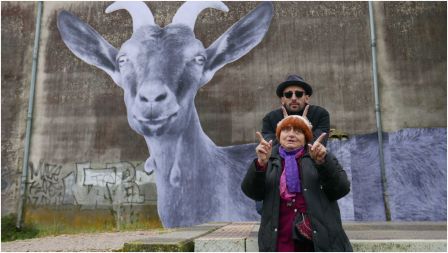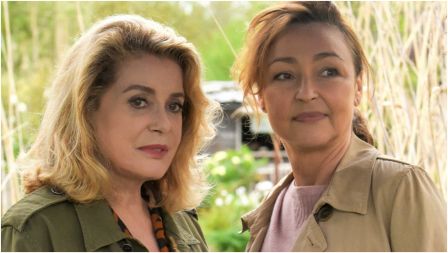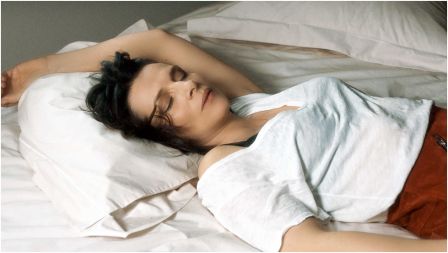French Movies
International Festival

Faces Places 2017
Visages villages
88-year-old Agnès Varda, working in collaboration with the young photo-muralist JR, reminds us that big themes can live in small places – and that every life yields something to celebrate. As the two travel across France, looking up old friends and creating artworks from photographs of the people they meet, a friendship blossoms, and with it a wonderful free flow of ideas and observations.
“She is nearly 90; he is 34. She worked with Jean-Luc Godard; he looks like Jean-Luc Godard (and, much to Varda’s consternation, will similarly not take off his sunglasses). And yet, the movie is barely five minutes old before it’s clear that these two are a screen duo for the ages... Varda has always possessed a warm and compulsively watchable screen presence, and the pint-sized iconoclast still has more pep in her step than most of us have ever had… JR is an absolute joy (and a mensch, to boot)… Teasing at times, quietly deferential at others, he taps into his co-star’s inherent sense of wonder and creates a canvas big enough for her to fit all of the ideas that she’s still dying to project.” — David Ehrlich, Indiewire
“In her magnificent, groundbreaking, nearly 60-year career, this is one of her most profoundly personal and exuberantly populist works. A tour de France that is both a romp and a meditation on photography, cinema, and mortality, with brief appearances by Mimi, the scene-stealing cat, it is at once poetry and the naked truth, shape-shifting before one’s eyes, and promising ever more pleasure with each viewing.” — Amy Taubin, Film
Frantz 2016
In a small German town, in the aftermath of WWI, young Anna mourns her fiancé Frantz who died in the trenches. One day a French soldier, Adrien (Pierre Niney, surely the leading French screen actor of his generation), arrives and lays flowers at Frantz’s grave. In the war-battered community passions run high at the effrontery of the Frenchman. Among those most affected is Anna, who decides to get to know the sad young stranger. As she draws him out about his pre-war friendship with Frantz in Paris, our picture of their generation struggling to recover after the betrayals of war deepens and takes unexpected turns.
The Midwife 2017
Sage femme
 Two of France’s most distinguished stars, Catherine Deneuve and Catherine Frot share the screen in this touching tale of the unlikely connection of opposites. Claire (Frot) is a dedicated and tireless midwife whose sense of pride and responsibility clash with the depersonalised efficiency of modern hospitals. She’s raised her son solo and is well pleased that he’s made it to medical school. One day she receives a strange phone call, a voice from the past. Béatrice (Deneuve), the extravagant and frivolous mistress of her late father, has pressing news and wants to see her again, over a drink, 30 years after having disappeared without a trace. Claire, habitually conscientious and sober, bridles at the prospect of having this foolish woman back in her life, but prepares to meet her regardless.
Two of France’s most distinguished stars, Catherine Deneuve and Catherine Frot share the screen in this touching tale of the unlikely connection of opposites. Claire (Frot) is a dedicated and tireless midwife whose sense of pride and responsibility clash with the depersonalised efficiency of modern hospitals. She’s raised her son solo and is well pleased that he’s made it to medical school. One day she receives a strange phone call, a voice from the past. Béatrice (Deneuve), the extravagant and frivolous mistress of her late father, has pressing news and wants to see her again, over a drink, 30 years after having disappeared without a trace. Claire, habitually conscientious and sober, bridles at the prospect of having this foolish woman back in her life, but prepares to meet her regardless.
Writer/director Martin Provost (Séraphine) has gifted two expert actresses with marvellously individual roles for an entertaining and emotional pas de deux. As old resentments are faced down, they tacitly acknowledge common fears, begin to enjoy each other’s shortcomings and build anew on their shared past.
“Martin Provost’s The Midwife once again proves that French filmmakers know how to treat actresses of a certain age... As the reigning grande dame of French cinema, Deneuve could easily rest on her laurels, only taking roles that befit and reinforce her stature. Which makes her vulnerable turn here all the more special. Playing a heart-on-her-sleeve, still-crazy-after-all-these-years free spirit, Deneuve delivers her best performance in recent memory.” — Ben Croll, Indiewire
A Woman’s Life 2016
Une vie
“The pathos and wonder of A Woman’s Life comes from its recognition that Jeanne is at once a captive of cruel circumstances and a wilful, intelligent human being. Her kinship with other 19th-century fictional heroines – Emma Bovary, Jane Eyre, Anna Karenina – is evident. She suffers, but she also reads, thinks and desires, and strives to find a zone of freedom within boundaries dictated by fate and society.
There are a few dramatic incidents, including outbreaks of emotional and physical violence, but the real action in the film is interior, and Mr Brizé’s greatest skill is his ability to imply the deep and complicated emotions beneath the placid, decorous surface of Jeanne. A Woman’s Life... moves calmly and deliberately, but it never feels slow. Instead, its images and scenes are suffused by an intensity that seems almost to be a quality of the light and air as they play across Ms Chemla’s watchful, sometimes inscrutable features.” — A.O. Scott, NY
Let the Sunshine In 2017
Un beau soleil interieur
Binoche plays the Angot surrogate, Isabelle, a Parisian artist, recently divorced from the father of her ten-year-old daughter. Alone and unleashed, she is undaunted in her yearning to connect sexually and romantically with a succession of men who, one way or another, come on to her. (Every actor in a Denis film leaves their mark, and each of Isabelle’s suitors carries his own peculiar brand of self-importance.)
There’s wry comedy in Isabelle’s impatience to cut to the unspoken intent in their blandishments, though the delight of consummation – so empathetically evoked by Denis, one of the cinema’s great sensualists – is likely to be followed by bemusement or dismay until she rallies for the next encounter.
“Binoche has gone from strength to strength in recent years; still, if she has ever been more radiant or effortlessly expressive on screen than she is here, the example is not immediately coming to mind. And Denis, whose narratives can be daringly free-associative, has structured Let the Sunshine In elegantly and intuitively, as a series of richly human encounters that flow, meander and pulse with life.” — Justin Chang, LA Times

 A mercurial Juliette Binoche absorbs our attention through every moment of this unexpected foray into romantic dramedy by the great French director Claire Denis. This is comedy in a specifically French literary mode, written by Denis in collaboration with the novelist and playwright Christine Angot. A leading light of the ‘
A mercurial Juliette Binoche absorbs our attention through every moment of this unexpected foray into romantic dramedy by the great French director Claire Denis. This is comedy in a specifically French literary mode, written by Denis in collaboration with the novelist and playwright Christine Angot. A leading light of the ‘